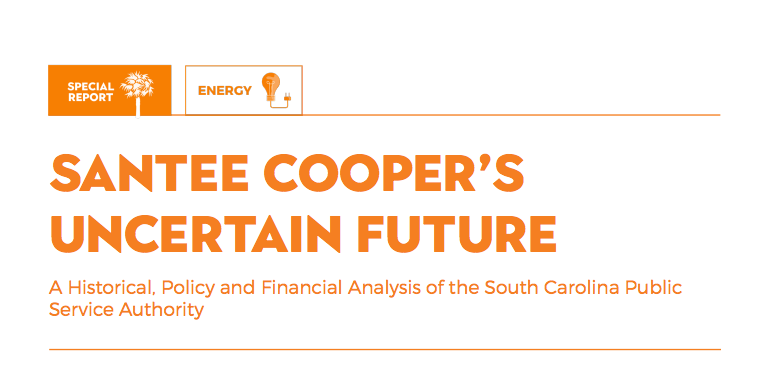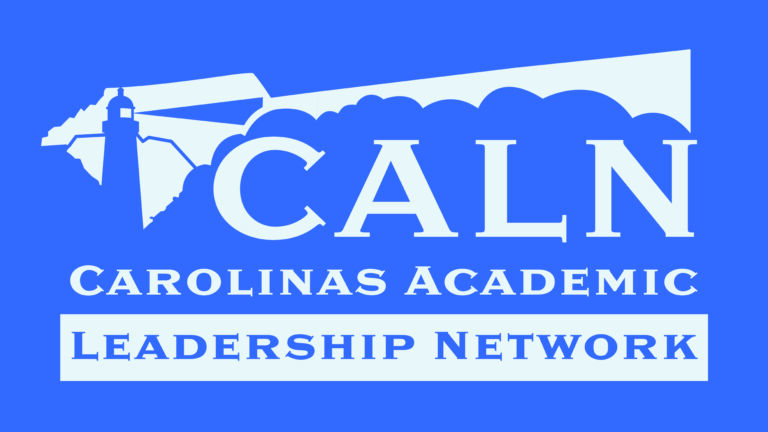Santee Cooper’s Uncertain Future
A Historical, Policy, and Financial Analysis of the South Carolina Public Service Authority
This is the executive summary of a larger report. Download the full report here (49 pages).
As the sheer magnitude of the V.C. Summer Units 2 and 3 nuclear abandonment, the largest financial disaster in South Carolina history, comes more into focus, we know Santee Cooper has borrowed $4.5 billion to date, its customers have already paid $540 million in four rate increases for the two defunct reactors, and the interest owed grows daily. Additionally, Santee Cooper has another $4 billion in non-nuclear debt that must be addressed. In total, Santee Cooper’s debt with interest is more than the entire state General Funds Budget for FY 2017-2018.
Because it is a state agency, Santee Cooper only makes “pseudo” profits. The average pseudo profit margin is 6.6%, which means Santee Cooper has only 6.6 cents on the dollar to put towards debt associated with V.C. Summer 2 & 3. This is not sustainable.
With Santee Cooper’s total outstanding debt looming at $7,494,568,000 as of publication time, action must be taken now.
Key Historical and Current Realities:
- From a historical perspective, Santee Cooper is unique. Facing the future, that uniqueness has both benefits and baggage.
- Santee Cooper has a symbiotic relationship with the Electric Cooperatives, especially after “The Agreement,” their most recent power contract of 2013.
- Santee Cooper has endangered economic development by antagonizing an industry it has been charged with serving.
- Santee Cooper doesn’t have a unique economic development motivation or ability among utilities.
- Santee Cooper’s rates are not an advantage for ratepayers after all.
- Residential rates for Santee Cooper customers are going to rise, not only because of VC Summer but because of the utility’s ongoing struggles to match its load capacity with customer demand as well as its operating debt of $4 Billion.
- The public is supportive of the sale of Santee Cooper.
- An outright sale would have the benefit of getting the government out of the electric utility business.
Not the Lowest Rates
Historically, Santee Cooper has offered its customers competitive rates. That has changed in the past five years. According to the South Carolina State Energy Office, here are stated rates for utilities operating in South Carolina:
- SCE&G – 14.56 cents per kWh
- SCE&G (without nuclear surcharge) – 11.93 cents per kWh
- Santee Cooper – 11.62 cents per kWh
- Santee Cooper (without nuclear surcharge) – 11.10 cents per kWh
- Duke Energy – 11.01 cents per kWh
- Duke Energy’s former Progress Energy territory – 10.01 cents per kWh
Santee Cooper Required Rate Increase Scenarios
Our economic research shows that future annual Santee Cooper utility bills will increase, anywhere from $166.99 per customer to upwards of $751.03, depending on demand elasticity for Santee Cooper electricity, the total debt and interest associated with the abandoned project, and Santee Cooper’s relationship with its largest customer, Central Cooperative.
Electricity rates would need to increase between 10-52%. Our analysis suggests a likely additional 13.62% rate increase, which would mean the average annual electricity bill increases by $194.49. This increase would be in place for the next 38 years, until the debt is paid in 2056.
In total, each average Santee Cooper residential customer would pay an additional $7,390.62 to pay their portion of the nuclear debt. Industrial customers could likely have their bills increased by as much as $80,000 a month.
Rates have already increased 15.2% since 2012.
Recommendation
In the opinion of the authors of this paper, having ratepayers pay the debt would be nearly criminal. The ratepayers of Santee Cooper, many of them already challenged economically, do not deserve to be saddled with additional costs due to the failure of Santee Cooper.
Santee Cooper must be sold. The State of South Carolina, through its General Assembly who has final authority, can and should find a buyer willing to somehow assume the agency’s debt.
Our recommendation is that the South Carolina General Assembly pass legislation this session to create a Commission on the Sale of the South Carolina Public Service Authority. It is important that the legislation establish the panel as a Commission and not another legislative study committee or feasibility committee. The goal of the Commission should not be to assess feasibility, but to seek independent valuation of Santee Cooper assets and vet potential offers.
This is the executive summary of a larger report. Download the full report here (49 pages).
The Authors
- Dr. Katie Player received her PhD in economics from Clemson University in 2012 and was an Assistant Professor of Finance at Furman University 2012-15. Player is joining the faculty at Wofford College in Fall, 2018. “Our economic analysis shows that, even with no change in demand, rates must increase significantly for all Santee Cooper customers, as well as those of the cooperatives, in order to service the VC Summer debt,” said Dr. Player. “However, we know that consumers are responsive to price changes; and those who can, will seek to reduce their electricity consumption. Unfortunately, not all consumer can conserve; in many cases, those who can least afford the rate hikes may be least able to impact their consumption. For example, renters are much less likely and able to invest in electrical conservation measures like adding insulation, wood burning stoves or solar panels.”
- Dr. M.T. Maloney is Emeritus Professor of Economics at Clemson University and the principal at Clemson Economic Associates. (Clemson Economics Associates is not affiliated with Clemson University.) “Postponing the imposition of higher rates on Santee Cooper and cooperative customers sounds like a great idea, until you realize that the full amount still remains to be paid, and that customers are on the hook for all of it,” said Dr. Maloney. “What we don’t know is just how long Santee Cooper can afford to service the debt before falling behind and catapulting the discussion into a new level.”
- Dr. Oran Smith received his Master of Public Administration and Doctor of Philosophy degrees from the University of South Carolina. He is Senior Fellow with Palmetto Promise Institute. “Santee Cooper must be sold,” said Dr. Smith. “Today, we are asking the South Carolina General Assembly to pass legislation this session to create a ‘Commission on the Sale of the South Carolina Public Service Authority.’ The goal of this Commission should not be to assess feasibility, but to seek independent valuation of Santee Cooper assets and vet potential offers.”






